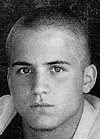Please continue to pray for Shane, who was injured while supporting Operation Enduring Freedom in Afghanistan earlier this week. His injuries came not long after his mom wrote
a loving tribute to him in the post below. God spared Shane's life, and his condition has been stabilized. He is making daily strides in his recovery, and we are so thankful to all who have taken the time to pray for he and his family and for those who have and will continue to skillfully and empathetically care for him.
The initial ordeal may be behind him, but Shane's recovery lies ahead. Please continue to remember him in your prayers, as well as all those who remain in country serving us and confronting the same dangers Shane faced.
Just before all of this occurred with Shane, I finished reading Ben Sherwood's book,
The Survivors Club (2009). The book is full of inspiring stories of survival and practical ways we can all better our chances of surviving any of the myriad ways we might, and most likely will, encounter some sort of trauma over the course of our lives.
A couple of the most indelible things I took away (and I took pages of notes) seem applicable as we consider what Shane and other members of our military are facing after being injured while serving our country in the hostile environment of Afghanistan.
Sherwood shares the findings of many authors, survivors and researchers in
The Survivors Club (Sherwood, 2009). The following are a couple of interesting ideas from a couple of his sources (noted below):
(p. 278)
Contrary to what you might expect, serious psychiatric problems are not a necessary and inevitable consequence of life’s worst crises. In fact, Dr. Calhoun (Trauma & Transformation, Richard D. Tadeschi and Lawrence G. Calhoun, 1995), believes that most people actually are transformed for the better from their battles with life’s toughest stuff...
“What we have found new and remarkable,” he writes in Trauma & Transformation, “is how often it [post traumatic growth] happens and how apparently ordinary people achieve extraordinary wisdom through their struggle with circumstances that are initially aversive in the extreme.”
(p. 286)
In his provocative book Healing Invisible Wounds (Dr. Richard Mollica, 2006), he asks why we are quick to believe that a knife wound to the chest will heal but an injury to the mind will never repair itself. In a biological sense, he believes, there is no difference between an injury to the body and an injury to the mind.
Dr. Mollica calls this “self-healing” a force inside all human beings “to restore our physical and mental selves to a state of full productivity and quality of life, no matter how severe the initial damage...
“The full flowering of human resilience is awesome,” he says. Every human being is born with the strength to heal.
Keep in mind your own potential for survival and your ability to grow no matter the circumstance. When we face something difficult in our lives, we are each challenged to find the strength to heal. We also decide whether or not to allow ourselves an awareness of the extraordinary way God wants to use the ordeals we face for his purpose.
We will be praying for Shane and Jake and Eddie Joe (2/2 Marines), as well as other injured service members as they fight to overcome the trauma they have endured and to hopefully experience post traumatic growth from what they've been through. We want to say "thank you" to each of them and to each of our military men and women who serve. We ask God for special care for those who have paid a physical and emotional price for the freedom we enjoy each day and for the families of those who paid the ultimate price with their lives.
We are humbled by their sacrifice, and we are grateful to them and for them.
If anyone else would like to submit a story of their 2/2 Marine, the offer still stands. I welcome the opportunity to post them here.












No comments:
Post a Comment